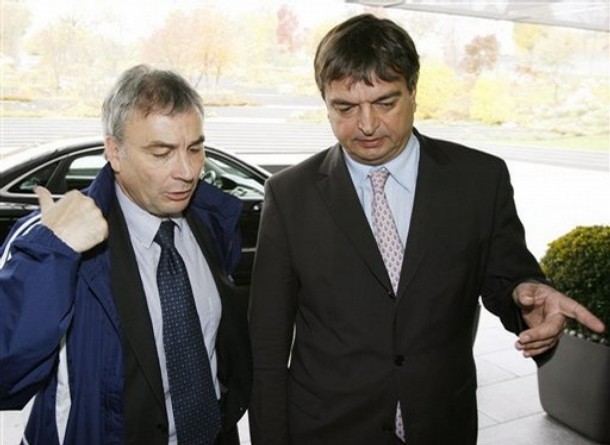As football movers and shakers head to Angola this week for the finale of the African Cup of Nations, some will still be mulling the significance of what happened the last time many of them set foot on the continent early last month.
At a landmark meeting of FIFA’s ruling Executive Committee, as we now know, a discussion took place that led last week to the departure from FIFA of Jérôme Champagne, the body’s Director of International Affairs and a key ally for many years of FIFA President Joseph Blatter
To be honest, some journalists had been tempted to dismiss the meeting, on Robben Island, where Nelson Mandela was imprisoned by South Africa’s former apartheid regime, as essentially a photo opportunity - a chance for FIFA dignitaries to bathe in the great man’s aura.
I might not have been entirely innocent of this myself.
How wrong we were.
Not only were the stories told with great dignity by former prison inmates genuinely moving and powerful, as I have already written.
But the meeting itself turns out to have been anything but routine.
I was there at the press conference that followed the meeting, still clutching my suitcase, having dashed across Cape Town from plane to boat with the assistance of Richard Lapper, the Financial Times’s Johannesburg Correspondent.
More than that, as I realised with some embarrassment last week, I was chatting to Champagne, waiting for the press conference to start, at around the time his fate must have been being sealed.
With hindsight, you could have guessed from the FIFA President’s demeanour that something was up.
“Blatter looks really shaken,” my contemporaneous notes, written on one of those distinctive FIFA pads marked out like a football pitch, record.
At the time, though, I put it down to the special location and perhaps the blazing sun.
In retrospect, I think it likely that the rigours of what seems to have been a particularly tough meeting may also have played a part.
 As well as the Champagne issue, I have been told that a bone of contention arose over an alleged cost overshoot relating to last year’s under-17 World Cup in Nigeria.
As well as the Champagne issue, I have been told that a bone of contention arose over an alleged cost overshoot relating to last year’s under-17 World Cup in Nigeria.
This was won somewhat improbably by Switzerland, who beat the hosts 1-0 in the final.
Two sources have told me independently that the cost overshoot amounts to a hefty $30 million (£18.6 million).
Returning to Champagne (pictuered here, on the right, with UEFA general secretary David Taylor) , my insideworldfootball colleague Andrew Warshaw has written: “It is understood the presidents of all six footballing Confederations met privately with Blatter at last month’s Executive Committee meeting on Robben Island to express their displeasure with the way Champagne had been conducting himself.”
One of them - Mohamed Bin Hammam of the Asian Football Confederation (AFC) - has since told me in a private phone call that, when an issue arose, “[Champagne] wanted to put himself between the confederations and the national associations within that confederation”.
I have to say that this could be interpreted as Champagne doing his job.
It is my understanding that he acted, in effect, as the FIFA President’s eyes and ears in the national associations.
FIFA’s statutes require each confederation to “work closely with FIFA in every domain” so as to “improve the game of football constantly and promote it globally…particularly through youth and development programmes”.
Confederations are obliged, moreover, to take any action considered necessary to develop football within their continent “with the mutual cooperation of FIFA”.
It will come as little surprise, though, to serious students of the shadowy realms of world football politics to hear that Champagne’s efforts were not universally appreciated.
To this extent, the most interesting question to think about with regard to last week’s bombshell is not why Champagne was ousted, but why he was ousted when he was.
Well, one important thing to have changed recently is that Blatter has let it be known that he wants a fourth term as President.
It would greatly smooth his path to that ambition - and bear in mind he would be within shouting distance of his 80th birthday by the time it ended - if the Confederation Presidents a) did not run against him and b) marshalled support for his candidacy inside the national associations.
It could be, then, that the confederation bosses decided to try and make the most of this temporary extra leverage by ridding themselves of the unfortunate Champagne.
Of course, the $64,000 question for adherents to this theory is whether, having once got their way, the appetites of confederation presidents will be sated or whetted.
In short, does it make it more or less likely that Blatter will face a plausible challenger?
For now, I think, you could justifiably read the runes either way.
Perhaps the confederation leaders targeted a close Blatter ally because they lack the firepower/unity - or simply are not minded - to attempt to dislodge Blatter himself.
On the other hand, what has transpired leaves the FIFA President looking, to my mind, a weaker leader than he did a few months ago.
I can think of at least two possible challengers whose recent actions, as relayed to me, appear consistent with the sort of things you might expect a potential candidate to be doing.
I still would not be surprised, especially if the 2010 World Cup goes anything less than swimmingly, if Blatter ends up this time with a race on his hands.
David Owen is a specialist sports journalist who worked for 20 years for the Financial Times in the United States, Canada, France and the UK. He ended his FT career as sports editor after the 2006 World Cup and is now freelancing, including covering last year’s Beijing Olympics. An archive of Owen’s material may be found by Twitter users at www.twitter.com/dodo938

.jpg)